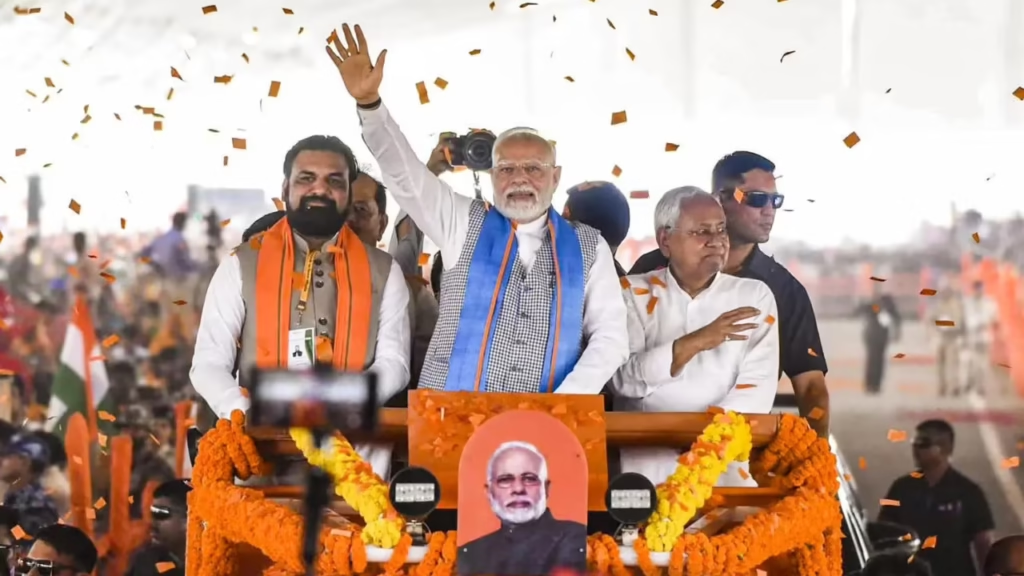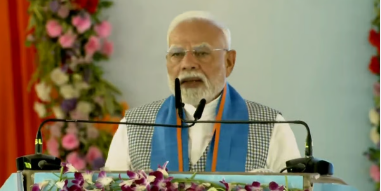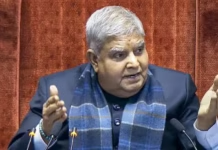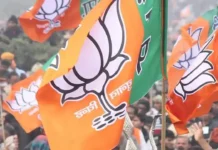
In a powerful speech that captured both national and regional attention, Prime Minister Narendra Modi delivered a direct and emotionally charged attack against the opposition alliance in Bihar. Referring to the Congress party’s symbol of a hand (‘panja’) and the Rashtriya Janata Dal’s (RJD) lantern, Modi claimed that the opposition coalition has damaged the self-respect and progress of Bihar. His statement stirred major political debate and served as a strong signal that the Bharatiya Janata Party (BJP) is preparing for a high-intensity campaign ahead of the upcoming Lok Sabha and state assembly elections.
PM Modi’s use of symbolic language resonated with the large gathering in Bihar where the speech was delivered. The Prime Minister stated that the “hand that looted the country and the lantern that pushed Bihar into darkness” have now come together. According to him, the very symbols of these parties represent a history of misrule, corruption, and stagnation, and their alliance is nothing but a step backward for the people of Bihar.
The Symbolism of ‘Panja’ and ‘Lantern’
The significance of Modi’s speech lies in how effectively he used symbolism to make a point that would resonate deeply with ordinary voters. By describing the Congress party’s ‘panja’ as a symbol of corruption and the RJD’s lantern as a representation of ‘jungle raj’ or lawlessness, he painted a picture of political regression. Modi argued that this alliance is not about serving Bihar or addressing its issues but is purely a “greedy coalition driven by selfish motives.”
He further emphasized that this combination reminds people of the days when Bihar suffered from a lack of infrastructure, failed governance, and rising crime. The lantern, once a necessity in homes due to frequent power cuts and no development, was used to highlight the backwardness associated with RJD rule. The hand, on the other hand, has been linked with scandals and indecision during past Congress regimes. Through this narrative, Modi effectively brought emotional and historical context into a political message.
A Reminder of Opposition’s Past Governance
Modi’s speech went beyond symbolism as he delved into the actual record of governance under Congress and RJD. He stated that the Congress-led central governments were infamous for corruption, delayed decisions, and stalled development, which led to a policy paralysis that affected every corner of the country. Referring to the RJD, Modi reminded people of the 1990s and early 2000s in Bihar, when law and order had collapsed, kidnapping was rampant, and basic governance was missing.
He mentioned that “for 15 years, Bihar saw its worst days under lantern rule. Roads were broken, schools were empty, and the police had no control.” The RJD’s governance, according to Modi, had made people fearful and hesitant to even walk outside after dark. The Prime Minister added that Congress did little to help during that time, choosing instead to remain in alliance with RJD, supporting a regime that was clearly failing the people.
Modi Presents BJP as the Agent of Change
In contrast to the dark past of the opposition, Modi presented the BJP as the driver of development and transformation. He said that the NDA government, both at the Center and in Bihar (before the JD(U) split), worked tirelessly to uplift the state. Under his leadership, railways have been modernized, new highways have been built, and digital connectivity has improved across towns and villages. He also mentioned the establishment of AIIMS in Darbhanga, which is set to become a major healthcare facility in the region.
Modi cited several flagship schemes that have directly benefited Bihar. These include the Ujjwala Yojana, through which lakhs of households have received free gas connections; Swachh Bharat Abhiyan, under which toilets have been built across rural homes; PM Kisan Yojana, which ensures direct cash transfer to farmers; and Ayushman Bharat, which provides free health insurance to the poor. The Prime Minister proudly declared that “these are not just schemes; these are the foundations of a new Bihar.”
Opposition Responds to Modi’s Attack
Reacting swiftly to Modi’s remarks, RJD leader Tejashwi Yadav accused the Prime Minister of avoiding real issues like unemployment, inflation, and farmer distress. He said that BJP leaders are relying on old tactics of blaming the past instead of explaining their failures in the present. Similarly, Congress leaders said that the BJP is afraid of the growing popularity of the INDIA alliance, and that’s why they are focusing on rhetoric rather than solutions.
Tejashwi added that the people of Bihar are politically aware and will not fall for such emotional traps. He also reminded the public that during BJP’s time in power, prices of essential commodities have skyrocketed, and job creation has slowed down. However, despite these counterattacks, the emotional power of Modi’s speech continues to dominate headlines and social media debates.
2025 Elections: Battle for Bihar Begins
Modi’s speech is being viewed as the unofficial beginning of BJP’s election campaign in Bihar. With the 2025 state assembly elections also approaching, this political showdown is gaining momentum. The BJP, after breaking ties with Nitish Kumar’s JD(U), is working to reclaim lost ground and win Bihar on its own. On the other side, the Congress-RJD combine, under the INDIA alliance, is attempting to present a united front against the BJP’s growing dominance.
Political analysts believe that Modi’s message is designed to stir emotion and create fear of regression among voters. By highlighting past failures and presenting himself as the symbol of stability and growth, Modi hopes to secure both urban and rural support. His campaign is expected to focus heavily on the themes of national pride, cultural identity, and economic progress.
Emotional Messaging Around ‘Bihar’s Pride’
Perhaps the most powerful part of Modi’s speech was the emotional appeal around “Bihar ki shaan” or “Bihar’s pride.” He stated that aligning with the panja and lantern is like insulting the dignity of Biharis, who have historically been known for their intelligence, courage, and cultural depth. Modi said, “The land of Nalanda and Chanakya should not be dragged back by those who once ruled it through fear and corruption.”
He emphasized that it is time for Bihar to move forward with pride, not look back in shame. The message resonated strongly with the youth and first-time voters, many of whom see Modi as a symbol of change and opportunity. The Prime Minister urged people to reject dynastic politics and vote for governance that delivers results.
Law and Order as a Central Issue
Another theme of the speech was law and order, especially in the context of RJD’s past governance. Modi said that crime, especially kidnappings for ransom and gang violence, was once a daily affair in Bihar. He claimed that the BJP brought peace and structure to the state, allowing businesses to grow, tourism to rise, and education to expand. The comparison was sharp — a fear-ridden Bihar of the past versus a confident Bihar of today.
It remains to be seen how this emotionally driven and symbol-rich campaign message will influence Bihar’s voters. While unemployment and inflation remain genuine concerns, the emotional weight of ‘pride’ and ‘self-respect’ may prove to be an effective counter for the BJP. The real test will lie in whether voters trust BJP’s promises or seek a change through the INDIA alliance.
What is certain, however, is that PM Modi has changed the tone of the political conversation in Bihar. With this speech, he has thrown the first stone in what promises to be a fiercely contested and emotionally charged election season. His appeal to voters was not just about policy or history — it was about identity, pride, and the future of Bihar.


































